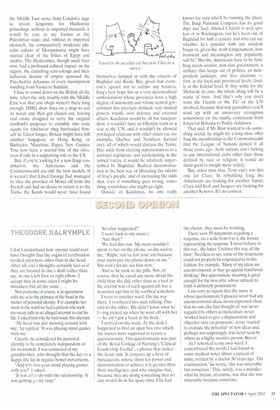THEODORE DALRYMPLE
I don't understand how anyone could ever have thought that the organ of cerebration resided anywhere other than in the head. After all, one's thoughts certainly feel as if they are located in one's skull rather than, say, in one's left foot or right elbow. I accept that in some cases I might be mistaken, but all the same. . . .
Not everyone, of course, is in agreement with me as to the primacy of the head in the matter of personal identity. For example, last week in the ward we had a patient who took too many pills in an alleged attempt to end his life. I asked him why he had made this attempt.
'My head was just messing around with me,' he replied. 'It was playing mind games with me.'
Clearly, he considered his personal identity to be completely independent of his mentation. I was reminded of my grandmother, who thought that the key to a happy life lay in regular bowel movements.
'And why was your mind playing games with you?. I asked.
It was all to do with the relationship. It was getting pretty crap.' 'So what happened?'
'I went back to my mum's.'
'And then?'
'We had this row. My mum wouldn't speak to her on the phone, so she said to me, -Right, you've lost your son because your mum put the phone down on me." She won't let me see him now.'
And so he took to the pills. Not, of course, that he cared any more about the child than she did, other than as a tool in the eternal war of each against all; but a wounded ego has to be soothed somehow.
I went to another ward. On the way there, I overheard two men talking. One said to the other, 'He didn't know what he f--ing picked up when he went off with her he ain't got a brain in his body.'
I arrived on the ward. At the desk I happened to find an open box into which the nurses were supposed to return a questionnaire. This questionnaire was part of the Royal College of Nursing's 'Clinical Leadership Toolkit', a phrase that makes the heart sink. It conjures up a bevy of bureaucrats, whose thirst for power and determination to achieve it is greater than their intelligence, and who imagine that, because they are doing something that no one would do in his spare time if he had the choice, they must be working.
There were 50 statements requiring a response, on a scale from 0 to 4, the former representing the response 'I never behave in this way', the latter 'I behave this way all the time'. Needless to say, some of the statements could not properly be responded to in this fashion: for example, 'Many of my ideas are unconventional, as they go against traditional thinking.' But approximate meaning is good enough for the new elite, whose attitude to truth is definitely postmodern.
I am sorry to report that the nurse at whose questionnaire I glanced never had any unconventional ideas, never expressed ideas that no one else had thought of. was never regarded by others as meticulous, never 'worked hard to give a dispassionate and objective view on proposals', never 'started to evaluate the potential' of new ideas and, perhaps not surprisingly, was never seen by others as a highly creative person. Bravo!
As I returned to my own ward, I remembered the words I had found in some medical notes about a patient of mine, written by a doctor 30 years ago. 'On examination,' he wrote, 'she was miserable but conscious.' This, surely, was a mistake: what he meant, of course, was that she was miserable because conscious.


































































 Previous page
Previous page